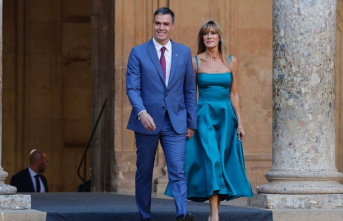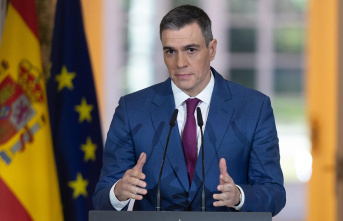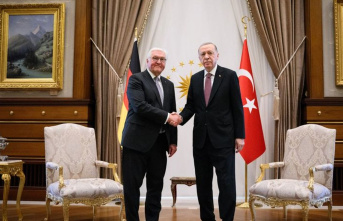In the face of fierce criticism from within her party, the new British Prime Minister Liz Truss made a crashing about-face right at the beginning of her term. After several MPs from their Conservative Party threatened to vote against the planned reduction in the top tax rate for top earners, Finance Minister Kwasi Kwarteng withdrew the plan. "We understood, we listened," he said on Monday from the Tory party conference in Birmingham.
The markets reacted positively, the pound, which had recently come under heavy pressure, shot up. But the repercussions for Truss, who had defended her plans the night before, could be devastating. "The message to her critics, of whom there are many, is that other unpopular measures - such as public spending cuts - can also be tossed out," commented Sky News. The reputation of the 47-year-old, who had announced that she would steadfastly enforce even controversial decisions, has suffered enormously.
Political scientist speaks of humiliation
Political scientist Mark Garnett called the reversal "the most humiliating decision" by a British government in decades. "Britain is now facing an extended phase of economic stagnation with a government whose reputation has already been irreparably damaged," Garnett told the German Press Agency. A convention attendee with good connections in the Tory group said MPs were deeply unsettled. "They don't dare to publicly defend the government line because they fear that the line will change overnight," said the man.
Finance Minister Kwarteng announced a week ago, among other things, that he would lower the top tax rate for annual incomes of at least £150,000 (€172,000) from 45 to 40 percent. The government wants to use it to boost economic growth. After the announcement of the debt-financed plans, the pound rate plummeted.
The British central bank felt compelled to step in and purchase government bonds with long maturities - without a ceiling. Several prominent members of the Tory party, such as ex-ministers Michael Gove and Grant Shapps, have slammed the tax breaks for the wealthy at a time of rising living costs and indicated they would vote against it in Parliament. However, Kwarteng wants to stick to other parts of the economic plan that are also controversial.
The Minister of Finance is now under enormous fire. Truss not only admitted on Sunday that she and Kwarteng made the decision on their own. The Prime Minister also stressed that the tax cut for the richest was Kwarteng's idea. The fact that the former hedge fund employee attended a reception with hedge fund managers the evening after the announcement of his plans also caused outrage.
Already the end for the new government?
The interest in Kwarteng's speech on Monday afternoon was all the greater. He only briefly responded to the about-face: "What a day," the minister began. "It was tough, but we have to concentrate on our tasks." His announcements of how he wants to get Britain moving again, true to the party convention motto "Getting Britain Moving", were repeatedly greeted with loud applause. For the time being, Kwarteng should have pulled his head out of the noose.
But the resentment in the party remains great. Many Truss critics avoid the party conference. If the government wants to save billions in public services as the next step, as reported by some media, renewed uproar could follow. Expert Garnett sees no rebellion pending - if only for one reason: "The Tory MPs are unwilling to change their party leader again." Because then a new election is hardly avoidable - according to surveys, however, numerous Tories would lose their mandates in this case.












